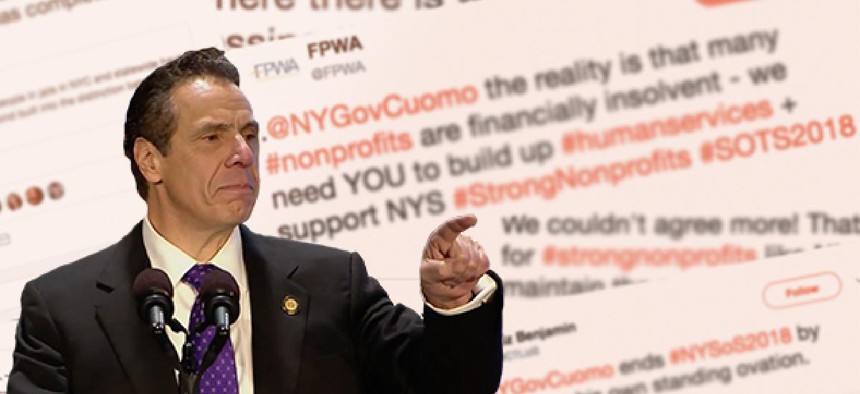Nonprofit sector has mixed reaction to State of the State address

Illustration by Zach Williams/ NYN Media
Nonprofit leaders had mixed reactions to Gov. Andrew Cuomo’s 2018 State of the State address.
On the one hand, Cuomo highlighted several issues in his speech on Wednesday that are important to organizations across the state, including homelessness, bail reform, sexual harassment and the opioid crisis. But nonprofit leaders say the governor neglected to provide details on how proposals would be funded – and more importantly, what relief the state would provide to human service organizations struggling to remain solvent.
“I think the governor can’t accomplish his agenda if he does not invest in the nonprofit sector,” Allison Sesso, president of the Human Services Council, said in a telephone interview.
The governor did not explicitly mention the sector during his 90-minute address, nor did he address several issues that nonprofits have raised with his office, such as an unfunded mandate to increase the minimum wage and how state initiatives can lead to indirect costs to nonprofits.
Employment in New York’s human services nonprofits doubled between 1990 and 2016, according to a 2017 report, but state contracts do not cover the full cost for nearly half of nonprofit contractors. Pay is so low for workers in the sector that 60 percent of them utilize or have a family member utilizing public assistance like food stamps or Medicaid, the report added.
But such omitting these issues was not the only complaint from nonprofits about the State of the State. The Child Victims Act, which would give victims of abuse more time to bring criminal and civil charges against offenders, also went unmentioned in the speech. A Jan. 2 rally in Manhattan brought out elected officials and nonprofit leaders in support of the legislation, which passed the Assembly last year, but did not reach the state Senate floor.
“In this #MeToo moment it’s especially disappointing to see the Governor fail to mention child victims of sexual abuse in his State of the State address, even as he correctly prioritizes the issue of sexual harassment in the workplace,” read a statement from the nonprofit Safe Horizon.
But not everyone was disappointed with Cuomo’s speech. A proposal to implement free after-the-bell school breakfasts to end “lunch shaming” across the state was released by the governor’s office in the run-up to the speech. The proposal would also require that food pantries be provided on all CUNY and SUNY campuses
It didn’t matter that Cuomo did not bring it up on Wednesday, according to Joel Berg, CEO of Hunger Free America.
“When this is passed into law and kids get to eat, they're not going to care that it wasn't in the speech,” Berg said in a telephone interview. “It certainly is a huge win.”
A proposal to end monetary bail in most cases and boost re-entry programs also drew praise, as did another proposal to outlaw the use of government funds for legal settlements related to alleged sexual harassment.
The lack of acknowledgement by the governor of the role that nonprofits would play in realizing his proposals also disappointed some in the sector. Nonprofit leaders told Cuomo their priorities in the past year, only to find that governor would go his own way in presenting a progressive image for what New York government can accomplish in the year ahead.
And that is hurting the bottom line for nonprofits across the state, Sesso said.
“There was nothing in his State of the State to address the insolvency issues the nonprofit sector is is facing,” she said. “It’s frustrating to hear that his philosophy sounds like it’s aligned with the nonprofit sector, but when you dig deeper it's not."
Other nonprofits praised the overall progressive themes of the speech, especially the combative rhetoric that Cuomo aimed at the Trump administration, which has proposed deep cuts to social programs like SNAP. Cuomo promised that the state would sue the federal government in order to block enactment of new tax rules that decreased property tax deductions.
“He spoke with moral clarity, hubris and the swagger found in every New York native,” Anthony Lopez, executive director of Zone 126, a Queens-based education nonprofit, said in a statement.
NEXT STORY: NYN Media Buzz: Jan. 4, 2018
